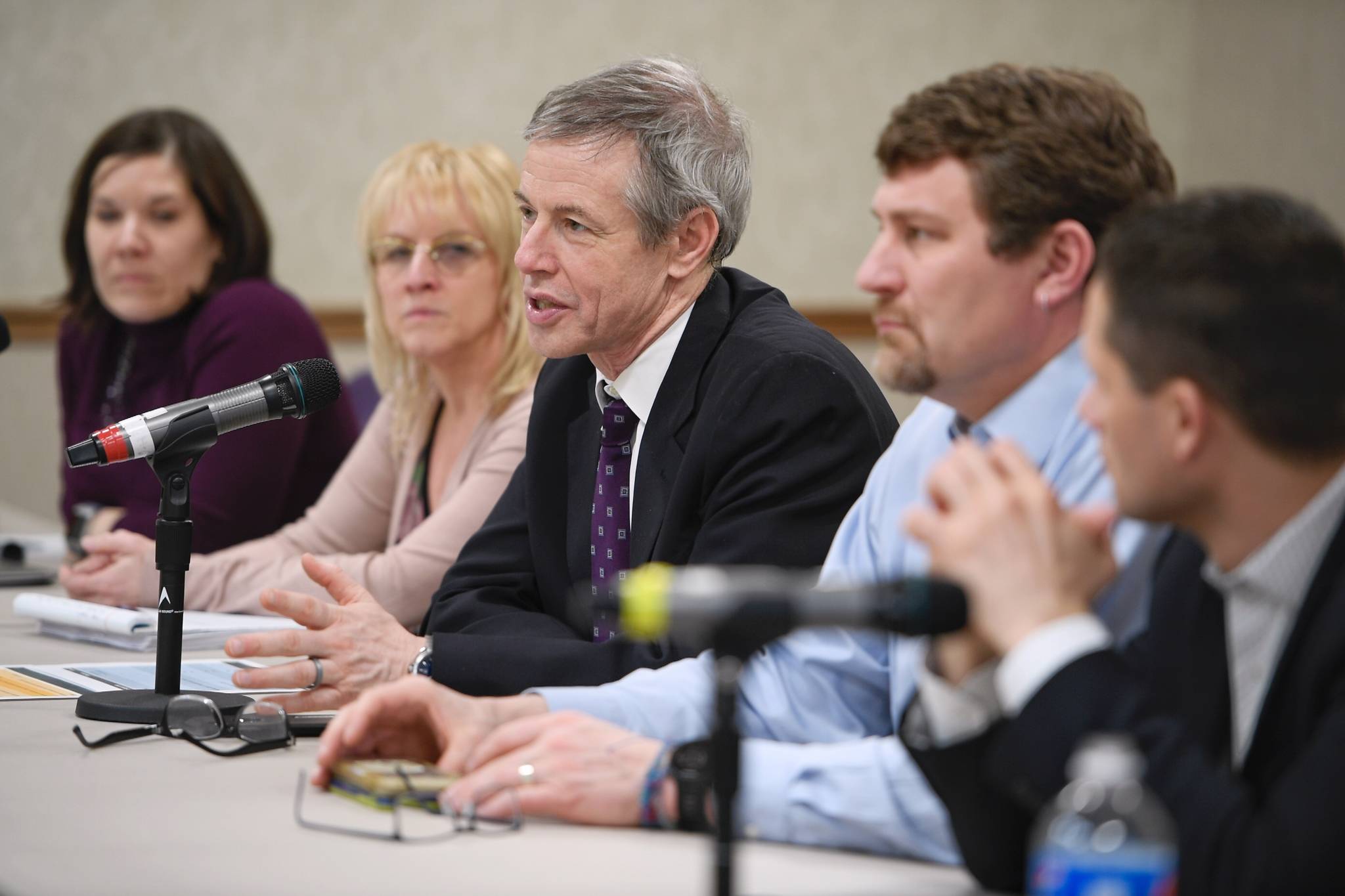A day after Gov. Mike Dunleavy announced four bills aimed at rolling back parts of Senate Bill 91, a statewide crime commission held a public meeting hoping to get feedback on the bill and its effects.
The meeting, held by the Alaska Criminal Justice Commission (ACJC), was advertised as a listening session for people who have been victims of crime. The bulk of the time was spent talking about SB 91, the criminal justice reform bill passed in 2016 aimed at reducing incarceration and recidivism rates.
Dunleavy’s proposed bills address sex crimes, pretrial processes, parole and prison sentences. Senate Bill 32, for example, intends to reinstate more severe sentencing ranges that were in place prior to SB 91.
In a letter that was submitted along with SB 32 to Senate President Cathy Giessel, Dunleavy wrote that SB 91 has limited the state’s ability to address the increase in crime.
“Most importantly, SB 91 has contributed to the loss of public trust in our criminal justice system and our ability to keep Alaskans safe,” Dunleavy wrote.
Dunleavy said in a Wednesday press conference there will be more bills coming up, hoping to “plug” some of the holes that he believes SB 91 has created in the state’s criminal justice system.
[Here’s a look at what Dunleavy’s four new crime bills would do]
Barbara Dunham, the project attorney for the ACJC, said the commission was not asked for recommendations prior to Dunleavy’s bills being announced. The commission was formed by former Gov. Sean Parnell and began meeting in 2014. The commission’s goal is to gather information and make public safety recommendations to the Legislature.
Juneau Police Department Chief Ed Mercer was in attendance at the ACJC meeting Thursday. When asked if he thought repealing SB 91 was a good idea, Mercer said a total repeal might be going too far but he’d like to see the Legislature spend some quality time considering changes.
“They need to take a hard look at it and see if it’s worth us continuing on there,” Mercer said. “I don’t think it’s going to be as easy as just repealing it 100 percent, but I think some amendments when it comes to dealing with repeat offenders over and over and clearly separating people who are career criminals out there to address them at a different level (than lower-level offenders).”
Proponents of the bill have said it will take a little time for effects of the bill to be fully felt. As crime rates rise, critics have called for a repeal of the bill.
It’s difficult to draw a line from SB 91 to a rise or fall in crime rates, members of the commission said. Rep. Matt Claman, D-Anchorage, said the recent rise in crime began prior to SB 91 going into effect.
“It’s always easy to blame something that passed the Legislature and not really get a lot of the details,” Claman, who is on the commission, said during the meeting.
Opening up the lines of communication
Only about 15 people showed up to Thursday’s ACJC event, which was held at Elizabeth Peratrovich Hall.
The commission includes members from around the state, including Brenda Stanfill, the commission’s victims’ rights advocate. Stanfill said they were hoping more people would show up so they could try to dispel a misconception about the commission, which provides recommendations to the Legislature on criminal justice issues including SB 91.
“This commission is not just about making things easier for somebody who’s harming our community,” Stanfill said during the meeting. “It’s about connecting those who are harming our community with the right services where they’ll stop harming our communities and assisting people who are being victimized in terms of making them whole.”
[Residents express frustrations, stories of Juneau crime wave]
Mercer said clearer messaging on the timeline of SB 91 would be helpful.
“I really think what would really be valuable for the state is to have a road map for the public … to say, ‘This is where we’re at and this is where we’re going to be.’ Right now, a lot of people don’t know that, including a lot of law enforcement like myself. I don’t know where this is going,” Mercer said.
Mercer mentioned that the number of Part 1 crimes — offenses such as burglaries, thefts and aggravated assaults — through the first quarter of 2018 began to decrease from totals in 2017, and it’s unclear whether any part of that can be attributed to SB 91’s efforts. Overall in recent years, crime has risen precipitously in Juneau. The number of Part 1 crimes has risen by 84 percent since 2014, according to the department’s annual Uniform Crime Reports.
Dunham said that if people had comments to share with the commission, they could email her at bdunham@ajc.state.ak.us and she would pass on comments to the commissioners.
• Contact reporter Alex McCarthy at 523-2271 or amccarthy@juneauempire.com. Follow him on Twitter at @akmccarthy.

